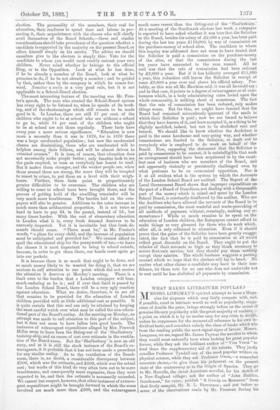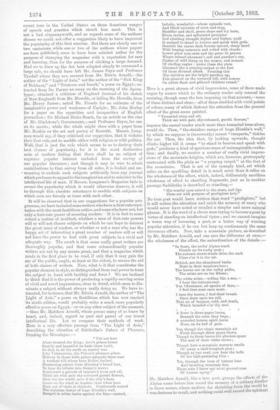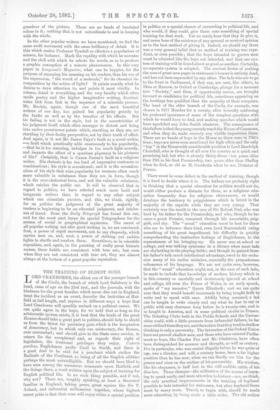WHAT MAKES LITERATURE POPULAR?
1TE SSRS. LONGMAN'S spirited attempt to issue a Maga- zine for sixpence which may fairly compete with, and, if possible, excel in intrinsic worth as well as popularity, Maga- zines of double the price, brings strongly before us the sediet of genuine literary popularity with the great majority of readers,-7 a point on which it is by no means easy for any critic to decide, unless he suppresses for the moment all reference to his own in- dividual taste, and considers calmly the class of books which win from the reading public the most signal signs of favour. Messrs. Longman, we see, regard Mr. James Payn as the novelist to Whotn they would most naturally turn when looking for great popular favour, while they ask the brilliant author of "Vice Versh." to lend them the supplementary aid of his talents. They justly consider Professor Tyndall one of the most popular writers on physical science, while they ask Professor Owen,—a somewhat eccentric choice,—to give them his judgment on the present state of the controversy as to the Origin of Species. They go to Mr. Howells, the clever American novelist, for his sketch, of a New-England village ; ask the author of "John Halifax, Gentleman," for verse ; publish "A Gossip on Romance" from that lively essayist, Mr. R. L. Stevenson ; and put before us some of , the observations made by Mr. Freeman during his recent tour in the United States on those American usages of speech and practice which struck him most. This is not a bad sixpennyworth, and as regards some of the authors chosen we could not offer a suggestion likely to have improved the popularity of this first number. But there are clearly one or two omissions, while one or two of the authors whose papers are here published, seem to have been selected rather for the purpose of stamping the magazine with a reputation for care and learning, than for the purpose of eliciting a large demand. Had we to draw up the list best adapted simply to command a large sale, we should have left Mr. James Payn and Professor Tyndall where they are, secured from Mr. Edwin Arnold,—the author of the "Light of Asia," not the author of the" Sick King of Bokhara," and "Tristram and Iseult," a poem on Egypt ;. ex- tracted from Dr. Farrar an essay on the meaning of the Apoca- lypse; obtained a criticism of England (instead of his sketch of New England) from Mr. Howells, or failing Mr. Howells, from Mr. Henry James ; asked Mr. Froude for an estimate of the imaginative power and weakness of Carlyle ; Mr. John Morley for a paper on the capacities and incapacities of English Journalism; Sir Michael Hicks-Beach, for an article on the sins of Mr. Gladstone'a Government,--and Professor Bryce, for one on its merits ; while the whole might close with a paper from Mr. Ruskin on the art and poetry of Rossetti. Messrs. Long- man would say, if they criticised our suggestion, that it violates their first rule, not to meddle either with religion or with politics.
Well, that is just the rule which seems to us to destroy their best chance of popularity, for it is the most distinctive note. of modern feeling that there shall be no subject of supreme popular interest excluded from the survey of
our popular literature ; and though it may be wise to admit
contributions to that survey from all sides, it is foolish and un- meaning to exclude such subjects artificially from any journal which professes to appeal to the imagination and to minister to the intellectual life of man. If Messrs. Longman's Magazine fails to secure the popularity which it would otherwise deserve, it will be through this obsolete reluctance to meddle with subjects on which men are fiercely at issue with each other.
It will be observed that in our suggestions for a popular pro- gramme, we have included some writers sv hob ave first-ra.te repu- tationwith the most fastidious critics, and some who have not, but Only a first-rate power of securing readers. It is in fact to some extent a matter of accident, whether a man of first-rate powers will or will not choose subjects on which he can hope to interest the great mass of readers, or whether or not a man who has the happy art of interesting a great number of readers will or will
not have the power to deal with great subjects in a vivid and adequate way. The result is that some really great writers are thoroughly popular, and that some extraordinarily popular writers are not by any means great, and that a magazine whibh needs in the first place to be read, if only that it may gain the .ear of the public, ought, at least at the outset, to secure the aid of both classes of writers. Now, what is it that constitutes the
popular element in style, as distinguished from real power to treat the subject in . hand with lucidity and force P We are inclined to think that it is the power of producing a rapidly-moving series of vivid and novel impressions, clear in detail, which seem to illu- minate a subject without always really doing so. We have in- timated, for instance, that Mr. Edwin Arnold, the author of "The Light of Asia," a poem on Buddhism which has now reached its ninth edition, would probably write a much more popularly effective poem on Egypt,—or on any other subject of the moment, —than Mr. Matthew Arnold, whose poems many of us know by heart, and, indeed, regard as part aad parcel of our truest intellectual life. Let us compare their methods of work. Here is a very effective passage froin "The Light of Asia," describing the situation of Siddartha)s Palace of Pleasure, fronting the Himalayas :— "Yet not love Alone trusted the King; lore's prison-houso Stately and beautiful he bade them build, So that in all the earth no marvel was Like Vishrain van, the Prince's pleasure.place. Midway in those wide palace-grounds there rose A verdant hill whose base Roltini bathed, Murmuring edema from Ilimalay's broad feet, To bear its tribute into Guava's waves.
Southward a growth of tamarind trees and sill, Thick set with pale sky-coloured gantlii flowers, Shut out the world, save if the city's hum Came on the wind no harsher than when bees ' Hum out of sight in thickets. Northwards soared The stainless ramps of huge Himilla's wall, Ranged in white ranks against the blue—untrod, Infinite, wonderful—whose uplands vast, And lifted universe of crest and crag, Shoulder and shelf, green slope and icy horn, Riven ravine, and splintered precipice Led climbing thought higher and higher, until it seemed to stand in heaven and speak with gods. Beneath the snows dark forests spread, sharp laced With leaping cataracts and veiled with clouds : Lower grew rose-oaks and the groat fir groves Where eohoed pheasant's call and panther's cry, Clatter of wild sheep on the atones, and scream Of circling eagles : under these the plain Gleamed like a praying-carpet at the foot Of those divinest altars. Fronting this The builders set the bright pavilion up, Fair-planted on the terraced hill, with towers On either flank and pillared cloisters round."
Here is a great stream of vivid impressions, some of them made vague by names which to the ordinary reader only conceal the meaning, though none the less imposing on that account,—some of them distinct and clear,—all of them studded with vivid points of colour, many of which distract the attention from the general effect of the great scene painted. "Tamarind trees and sill, Thick set with pale, sky-coloured, ganthi flowers," impress the casual reader much more than tamarind trees alone, would do. Then, "the stainless ramps of huge Himila's wall," by which we suppose is (incorrectly) meant "ramparts," tickles the oar. Then, the idea that, by looking upwards, thought climbs higher till it seems "to stand in heaven and speak with gods," produces a kind of spurious sense of unimaginable exalta- tion; and finally, we receive a number of really vivid impres- sions of the mountain-heights, which are, however, grotesquely contrasted with the plain as "a praying carpet" at the foot of the mountains. That is art of the spangly kind, art which relies on the sparkling detail in it much more than it relies on the wholeness of the effect, which, indeed, deliberately sacrifices wholeness of effect to startling fragments, just as in another passage Sadddrtha is described as standing,— " His tearful eyes raised to the stars, and lips Close.set with purpose of prodigious love."
No true poet would have written that word "prodigious," but it will waken the attention and catch the memory of many who would never have noted or recalled a simpler and more natural phrase. It is the word of a clever man trying to become a poet by virtue of standing on intellectual tiptoe ; and we cannot imagine a worse way of becoming a poet, or a better way of winning popular attention, if he can but keep up continuously the same
strenuous efforts. Now, take a mountain picture, as described by Mr. Matthew Arnold, and one sees the difference at once,—
the wholeness of the effect, the subordination of the details :— "In front, the awful Alpine track Crawls up its rocky stair ; The autumn storm-winds drive the rack Close o'er it in the air.
Behind, are the abandoned baths Mute in their meadows lone; The leaves are on the valley paths, The mists are on the Rhone; The white mists,—rolling like a sea,— I hear the torrents roar.
Yes, Obermann, all speaks of thee,— I feel thee near once more.
I turn thy leaves, I feel their breath Onoe more upon me roll, That air of languor, cold, and death, Which brooded o'er thy soul.
A fever in these pages burns, Beneath the calm they feign ; A wounded human spirit turns Here, on its bed of pain.
Yes, though the virgin mountain air _ Fresh through these pages blows, Though to these leaves the glaciers spare The soul of their white snows ; Though here a mountain murmur swells Of many a dark-boughed pine ; Though as you read, you hear the bells Of the high-pasturing kine ; Yet, through the hum of torrent hone And brooding mountain bee, There sobs I know not what ground-tono Of human agony."
Mr. Matthew Arnold, like a true poet, groups the effects of the Alpine scene before him round the memory of a solitary dweller in those scenes, whose motives for shrinking from the world he was desirous to recall, and nothing could well exceed the Spiritual grandeur of the picture. There are no beads of insulated colour in it ; nothing that is not subordinate to and in keeping with the whole.
In the other popular writers we have mentioned, we find the same swift movement with the same brilliancy of detail. It is this which makes Professor Tyndall so effective a populariser of science, for instance. Mark the rapidity with which he narrates and the skill with which he selects his words, so as to produce a graphic conception of a minute phenomenon. In this very paper in Longinan's Magazine, what can be happier, for the purpose of stamping his meaning on his readers, than his use of the expression, "the wreck of a molecule," for its chemical de- composition by the action of light P It paints exactly what he desires to draw attention to, and paints it most vividly. In science, detail is everything, and the very faculty which often Spoils poetry and the higher imaginative writing, discrimi- nates link from link in the sequence of a scientific process. Mr. Ruskin, again, though one of the most beautiful writers of our day, has gained his popularity greatly by the faults as well as by the beauties of his effects. But his failing is not in the style, but in the eccentricities of his judgment itself, which often manages to distort and bring into undue prominence points which, startling as they are, are startling by their faulty perspective, not by their truth of effect. And again, is it not Mr. James Payn's fault as a novel-writer, —a fault which practically adds enormously to his popularity, —that he is too amusing, indulges in too much light comedy, and imparts the effect of a spurious piquancy to his pictures of life P Certainly, that is Canon Farrar's fault as a religious writer. His rhetoric is far too fond of impressive contrasts or combinations ; his style is sensational ; and it is the sensation- alism of his style that wins popularity for sermons often much more valuable in substance than they are in form, though it is the over-rhetorical form, and not the valuable substance, which catches the public ear. It will be observed that in regard to politics, we have selected much more lucid and temperate writers than in regard to any other Babied which can stimulate passion, and this, we think, rightly, for on politics the judgment of the great majority of readers is beginning to be an educated judgment, and intoler- ant of tinsel. Even the Daily Telegraph has found this out, and for the most part keeps its special Telegraphese for the arcana of social or geographical mysteries. The secret of all popular writing not also good writing is, we are convinced, first, a power of rapid movement, not to say rhapsody, which carries men on, and, next, a power of striking out sudden lights to startle and. awaken them. Sometimes, as in scientific exposition, and, again, in the painting of really great historic scenes, these habits are consistent with true art; but even when they are not consistent with true art, they are almost always at the bottom of a great popular reputation.




































 Previous page
Previous page